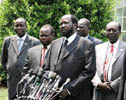
Sudan’s national census is complete, but anyone attempting to “check the box” on the daunting list of “to-be-implemented” provisions of the North-South Comprehensive Peace Agreement, or CPA, should hold off.
Several weeks ago, the Sudanese government in Khartoum announced the preliminary results of the census, claiming that Sudan’s population is just over 39 million people, with Khartoum state being the most populated territory.
Following this announcement, officials from the government of southern Sudan expressed their skepticism about the results, with the head of the southern Sudan census commission, Isaiah Chol, saying that “The census is political. Everything is politicized in the Sudan.”
The government of southern Sudan, or GoSS, claims that an accurate census has not been conducted in the region since 1956. Southern Sudanese officials had already warned that they will not accept results counting its population as less than a third of the country, roughly 11-13 million according to some GoSS officials.
The most controversial element of the census results is clearly the regional population breakdown, so when results began to leak that the census would count the South’s population as 8.2 million, tensions escalated quickly.
Last weekend, President of Southern Sudan Salva Kiir Mayardit went on the offensive, declaring the census results inclusive because he suspects figures were being “deflated in some regions and inflated in others,” making the final tally “unacceptable.”
President Kiir further discounted the census by taking issue with the results for Darfur, saying that, given the ongoing crisis and massive displacement and insecurity in that region, the jump from the 1993 census that counted Darfur’s population as 3 million, to the leaked results of the latest census of 7.2 million is inaccurate.
Given the ongoing crisis in Darfur, which has resulted in massive displacement and insecurity, President Kiir’s argument seems valid; the southern Sudanese president also posited that Darfur’s numbers were inflated to reduce the population of southern Sudan, which in 1983 was estimated at over 8 million. Granted, the North-South civil war, which began in 1983 and ended with the signing of the CPA in 2005, also resulted in at least two million deaths and the displacement of 4 million more people; however, with a return to fragile peace in the South, refugee returns have occurred and it is unlikely that the South’s population is on par with the number in 1983.
Bottom line: the government of South Sudan has clearly expressed its discontent with the leaked census results, and key ruling party officials in the South such as SPLM Secretary General Pagan Amun have suggested that the South will boycott the upcoming national elections in February 2010 if they deem the census outcome unacceptable.
In short, the “box” of “national census complete and accepted by both the North and the South” is definitely not checked.

